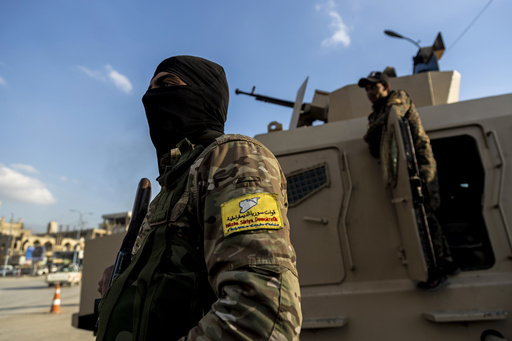QAMISHLI, Syria — In a significant development, the Syrian Democratic Forces (SDF), which are led by Kurdish fighters, announced on Tuesday that they have initiated a counter-offensive against the Turkish-aligned Syrian National Army (SNA). This military action aims to reclaim territories near Syria’s northern border with Turkey.
The SDF has been an essential ally of the United States in the region, focusing on dismantling sleeper cells belonging to the extremist Islamic State (IS) that are dispersed across eastern Syria. Following the recent downfall of Bashar Assad’s oppressive regime earlier this month, hostilities between the SDF and the SNA have escalated, particularly as the latter has succeeded in seizing the critical city of Manbij along with its surrounding areas.
These intense clashes come amidst a period of political negotiations concerning Syria’s future, which is reeling from over a decade of conflict and economic hardship. Ruken Jamal, a spokesperson for the Women’s Protection Unit (YPJ), part of the SDF, revealed that their fighters are approximately 11 kilometers (7 miles) from Manbij as they push forward in their counter-offensive.
Jamal accused Ankara of attempting to undermine the SDF’s bargaining power in ongoing discussions about Syria’s political destiny through the actions of the SNA. “Syria is now entering a new chapter, and talks are in progress regarding the country’s future,” she stated. “Turkey is attempting, through its aggression, to divert our attention with battles and push us out of the negotiations taking place in Damascus.”
According to the Syrian Observatory for Human Rights, a Britain-based monitoring group, the recent SNA offensive against the Kurdish forces has resulted in numerous fatalities on both sides since its commencement earlier this month.
On Tuesday, U.S. Defense Secretary Lloyd Austin held a conversation with Turkish Defense Minister Ya?ar Güler to discuss the escalating situation in Syria. As reported by Pentagon spokesperson Maj. Gen. Pat Ryder, Austin emphasized the necessity for close coordination to effectively counter IS operations in the region. They also addressed the importance of establishing conditions that could foster a more secure and stable Syria.
Turkey regards the SDF as an extension of the Kurdistan Workers’ Party (PKK), which it designates as a terrorist organization. Over the years, Turkish-backed forces, supported by air strikes from Turkish jets, have repeatedly targeted locations predominantly occupied by the SDF in northern Syria to create a buffer zone devoid of Kurdish influence along their extensive common border.
Despite being part of an insurgent movement aimed at toppling Assad, the SNA persists in its offensive against the SDF, which is viewed as a significant player in Syria’s evolving political landscape. On Monday, SDF spokesperson Farhad Shami reported that their forces successfully repelled Turkish-aligned rebels from zones near the Tishrin Dam on the Euphrates River, a vital hydroelectric plant. He also indicated that the SDF had destroyed a rebel tank southeast of Manbij.
The British-based watchdog further remarked that the Kurdish forces have managed to reclaim four villages in the vicinity of the strategic dam following a series of confrontations.
In recent days, Turkish aircraft have also targeted the important border town of Kobani. Throughout Syria’s uprising-turned-conflict, the Kurds have established a region of autonomous governance in northeastern Syria, maintaining an independent stance without fully aligning themselves with Assad or the rebel factions.
Even with the Assad regime’s recent transition, Turkey’s hardline stance against the Kurdish-led group appears unchanged. Turkish Foreign Minister Hakan Fidan’s recent visit to Syria underscored Turkey’s firm position regarding the SDF in his discussions with Ahmad al-Sharaa, the de facto leader of Hayat Tahrir al-Sham (HTS).
Fidan criticized the situation in the region, claiming it has been transformed into “a cauldron of terror” due to the presence of PKK affiliates and other leftist groups arriving from various nations, including Turkey, Iraq, Iran, and Europe. He expressed concern that the international community is indifferent to this lawlessness as the SDF oversees security against IS.
Amidst the ongoing conflict, SDF Commander Mazloum Abdi voiced apprehension over a potential resurgence of IS due to the resulting power vacuum and continuous clashes, which have hindered the SDF’s capability to conduct operations against IS sleeper cells. Currently, tens of thousands of children and family members associated with IS militants remain detained in expansive centers controlled by the SDF in northeastern Syria.



